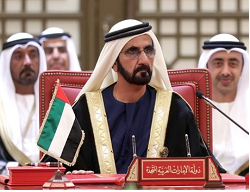Media Center
GCC summit kicks off in Manama as Sheikh Mohammed meets British PM
Sheikh Mohammed bin Rashid led the UAE delegation to the two-day GCC Summit on Tuesday, which is also being attended by UK Prime Minister Theresa May as she looks to expand trade ties ahead of Britain’s exit from the European Union.
The 37th annual talks among the six Gulf member states in Manama were expected to focus on security within the GCC, economic integration and enhancing regional policy alignment, especially regarding the region’s conflicts, the challenges of extremism, low oil prices and the growing clout of Iran in the Middle East.
Along with Sheikh Mohammed, Vice President and Ruler of Dubai, the country’s delegation included Deputy Prime Minister Sheikh Saif bin Zayed, foreign minister Sheikh Abdullah, and Obaid Al Tayer, minister of state for financial affairs.
Ms May, who is both the first British prime minister and the first female leader to attend the summit, is seeking to enhance the Gulf strategy pursued by her Conservative predecessor that has taken on more urgency after the UK’s vote to leave the EU.
Sheikh Mohammed, who met with Ms May on Tuesday, tweeted afterwards: "In this fast-changing global climate, the solid bond and friendship between our nations and people remain as solid as ever."
London hopes that by building on its relationships in the Arabian Gulf, it can offset economic fallout from its EU departure, and show that it still is an important international power. The election of the unpredictable Donald Trump to the White House may also help Ms May make her case in the Gulf.
"I hope my visit will herald the start of a new chapter in relations between the United Kingdom and the Gulf – a true strategic partnership that enables us to together seize the opportunities ahead and ensure the security and prosperity of our people", Ms May said before she arrived in Manama.
"I will have the opportunity to talk to all six leaders about how we can develop our trade relationship, as well as cooperation on security and defence," she said. "As the UK leaves the EU, we should seize the opportunity to forge a new trade arrangement between the UK and the Gulf.
Under David Cameron, a long-term strategy was put in place that seeks to diversify the economic relationship with the Gulf beyond defence and security, and promote tourism and cultural links between Britain and the GCC as well as to more closely coordinate on fostering regional stability.
Mr Cameron’s government began work on a permanent UK naval base in Bahrain, and announced plans for a permanent army facility in Oman – the two GCC countries with the closest ties to Britain.
But aligning with the GCC on a strategic vision for the region that will provide a framework for the future of London’s relationships in the Gulf could prove difficult for Ms May, as it has with the US under Barack Obama, especially as calculations diverge regarding the threat posed by Tehran, the war in Yemen and the causes of extremism.
But the Gulf countries are eager to work with foreign partners on economic diversification, which will be the focus of talks in Manama.


